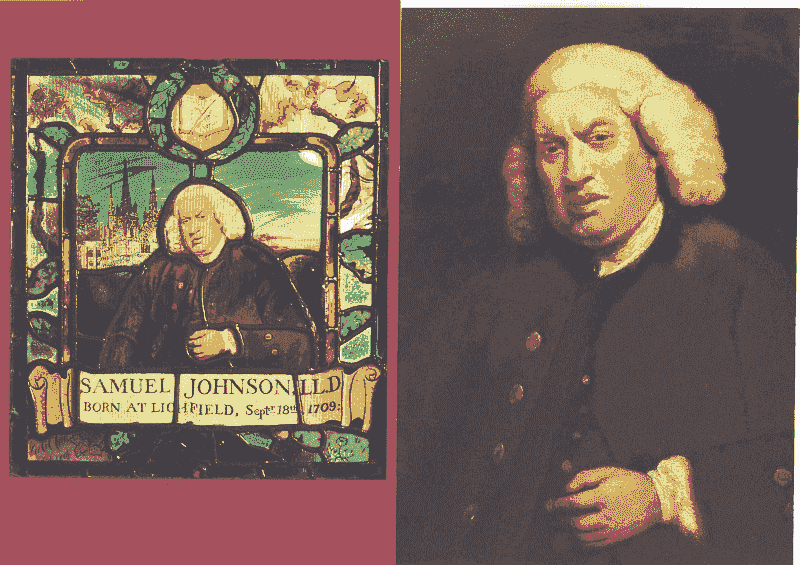hellog〜英語史ブログ / 2016-07-29
01 02 03 04 05 06 07 08 09 10 11 12 13 14 15 16 17 18 19 20 21 22 23 24 25 26 27 28 29 30 31
2016-07-29 Fri
■ #2650. 17世紀末の質素好みから18世紀半ばの華美好みへ [rhetoric][style][johnson]
文学史・文体論史では,17世紀終わりから18世紀終わりの Augustan Period において,特にその前半は,質素な文体が好まれたといわれる.しかし,18世紀前半から,地味な文体に飽き足りず,少しずつ派手好みの文体に挑戦する文筆家が現われていた.ラテン語の華美な魅力に耐えられず,派手さを喧伝する書き手が現われたのだ.その新しい方針を採った文豪の1人が Samuels Johnson である.彼こそが18世紀半ばの華美好みの書き手の代表者となったということから,この文体の潮流の変化は "Johnson's Latinate Revival" ともいわれる.

18世紀中に文体や使用する語種に変化があったことは,明らかである.Knowles (137) によれば,
The typical prose style of the period following the Restoration of the monarchy . . . was essentially unadorned. This plainness of style was a reaction to the taste of the preceding period. Early in the eighteenth century taste began to change again, and there are suggestions that ordinary language is not really sufficient for high literature. Addison in the Spectator (no. 285) argues: 'many an elegant phrase becomes improper for a poet or an orator, when it has been debased by common use.' By the middle of the century, Lord Chesterfield argues for a style raised from the ordinary; in a letter to his son he writes: 'Style is the dress of thoughts, and let them be ever so just, if your style is homely, coarse, and vulgar, they will appear to as much disadvantage, and be as ill-received as your person, though ever so well proportioned, would, if dressed in rags, dirt and tatters.' At this time, Johnson's dictionary appeared, followed by Lowth's grammar and Sheridan's lectures on elocution. By the 1760s, at the beginning of the reign of George III, the elevated style was back in fashion.
The new style is associated among others with Samuel Johnson. Johnson echoes Addison and Chesterfield: 'Language is the dress of thought . . . and the most splendid ideas drop their magnificence, if they are conveyed by words used commonly upon low and trivial occasions, debased by vulgar mouths, and contaminated by inelegant applications' . . . . This gives rise to the belief that the language of important texts must be elevated above normal language use. Whereas in the medieval period Latin was used as the language of record, in the late eighteenth century Latinate English was used for much the same purpose.
ここで述べられているように,Augustan Period の前半は社会は保守的であり,その余波は言語的にも明らかである.例えば,OED でも他の時代に比べて新語があまり現われていない(cf. 「#1226. 近代英語期における語彙増加の年代別分布」 ([2012-09-04-1]),「#203. 1500--1900年における英語語彙の増加」 ([2009-11-16-1])).しかし,Augustan periods の後半,18世紀後半には前時代からの反動で,Johnson に代表される華美な語法が流行となるに至る.その2世紀前に "aureate diction" (cf. 「#292. aureate diction」 ([2010-02-13-1])) があったのと同様に,もう1度同種の流行がはびこったのである.
文体や語彙借用に関する限り,英語史においてこの繰り返しは何度となく起こっている.これは,例えば日本における漢字を重視する傾向のリバイバルなどと似たような事情でなないだろうか.
・ Knowles, Gerry. A Cultural History of the English Language. London: Arnold, 1997.
2026 : 01 02 03 04 05 06 07 08 09 10 11 12
2025 : 01 02 03 04 05 06 07 08 09 10 11 12
2024 : 01 02 03 04 05 06 07 08 09 10 11 12
2023 : 01 02 03 04 05 06 07 08 09 10 11 12
2022 : 01 02 03 04 05 06 07 08 09 10 11 12
2021 : 01 02 03 04 05 06 07 08 09 10 11 12
2020 : 01 02 03 04 05 06 07 08 09 10 11 12
2019 : 01 02 03 04 05 06 07 08 09 10 11 12
2018 : 01 02 03 04 05 06 07 08 09 10 11 12
2017 : 01 02 03 04 05 06 07 08 09 10 11 12
2016 : 01 02 03 04 05 06 07 08 09 10 11 12
2015 : 01 02 03 04 05 06 07 08 09 10 11 12
2014 : 01 02 03 04 05 06 07 08 09 10 11 12
2013 : 01 02 03 04 05 06 07 08 09 10 11 12
2012 : 01 02 03 04 05 06 07 08 09 10 11 12
2011 : 01 02 03 04 05 06 07 08 09 10 11 12
2010 : 01 02 03 04 05 06 07 08 09 10 11 12
2009 : 01 02 03 04 05 06 07 08 09 10 11 12
最終更新時間: 2026-01-27 10:29
Powered by WinChalow1.0rc4 based on chalow